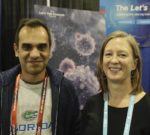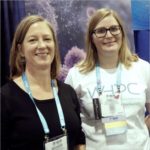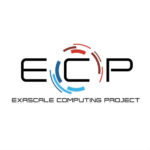In this episode of Let’s Talk Exascale, Ulrike Meier Yang of LLNL describes the xSDK4ECP and hypre projects within the Exascale Computing Project. The increased number of libraries that exascale will need presents challenges. “The libraries are harder to build in combination, involving many variations of compilers and architectures, and require a lot of testing for new xSDK releases.”
Podcast: UnifyFS Software Project steps up to Exascale
In this Let’s Talk Exascale podcast, Kathryn Mohror LLNL and Sarp Oral of ORNL provide an update ECP’s ExaIO project and UnifyFS. “UnifyFS can provide ECP applications performance-portable I/O across changing storage system architectures, including the upcoming Aurora, Frontier, and El Capitan exascale machines. “It is critically important that we provide this portability so that application developers don’t need to spend their time changing their I/O code for every system.”
Podcast: SCR Scalable Checkpoint/Restart Paves the Way for Exascale
A software product called the Scalable Checkpoint/Restart (SCR) Framework 2.0 recently won an R&D 100 Award. In this episode, Elsa Gonsiorowski and Kathryn Mohror of LLNL discuss what SCR does, the challenges involved in creating it, and the impact it is expected to have in HPC. “SCR enables HPC simulations to take advantage of hierarchical storage systems, without complex code modifications. With SCR, the input/output (I/O) performance of scientific simulations can be improved by orders of magnitude.”
Podcast: How the EZ Project is Providing Exascale with Lossy Compression for Scientific Data
In this podcast, Franck Cappello from Argonne describes EZ, an effort to effort to compress and reduce the enormous scientific data sets that some of the ECP applications are producing. “There are different approaches to solving the problem. One is called lossless compression, a data-reduction technique that doesn’t lose any information or introduce any noise. The drawback with lossless compression, however, is that user-entry floating-point values are very difficult to compress: the best effort reduces data by a factor of two. In contrast, ECP applications seek a data reduction factor of 10, 30, or even more.”
Let’s Talk Exascale: Developing Low Overhead Communication Libraries
In this episode of Let’s Talk Exascale, Scott Baden of LBNL describes the Pagoda Project, which seeks to develop a lightweight communication and global address space support for exascale applications. “What our project is addressing is how to keep the fixed cost as small as possible, so that cutting-edge irregular algorithms can efficiently move many small pieces of data efficiently.”
Fighting Cancer with Deep Learning at Scale with the CANDLE Project
In this episode of Let’s Talk Exascale, Mike Bernhardt discusses the CANDLE project for cancer research with Rick Stevens from Argonne National Lab. The CANcer Distributed Learning Environment (CANDLE) is an ECP application development project targeting new computational methods for cancer treatment with precision medicine.
ECP Launches “Let’s Talk Exascale” Podcast
The DOE’s Exascale Computing Project has launched a new podcast channel. In this episode, Danny Perez from Los Alamos National Laboratory discusses The Exascale Atomistic Capability for Accuracy, Length, and Time (EXAALT) project. EXAALT specializes in molecular dynamics simulations of materials. “We hope you enjoy the podcast, and we welcome your ideas for future episodes.”










